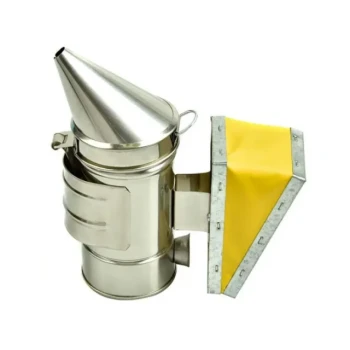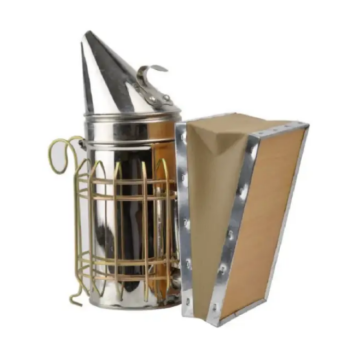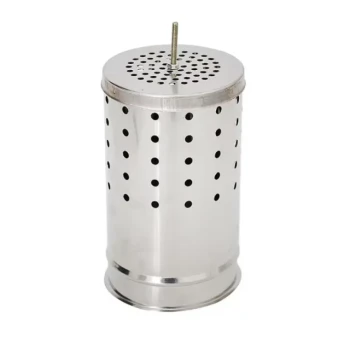In short, the purpose of a bee smoker is to calm honeybees and suppress their defensive instincts during hive inspections. It works by using cool, white smoke to mask the alarm pheromones that signal an attack and by triggering a primal survival response that preoccupies the bees, making hive management significantly safer for both the beekeeper and the colony.
A bee smoker doesn't sedate the bees; it strategically redirects their focus. By simulating a distant threat, the smoke exploits the bees' survival instincts, effectively overriding their immediate impulse to defend the hive.
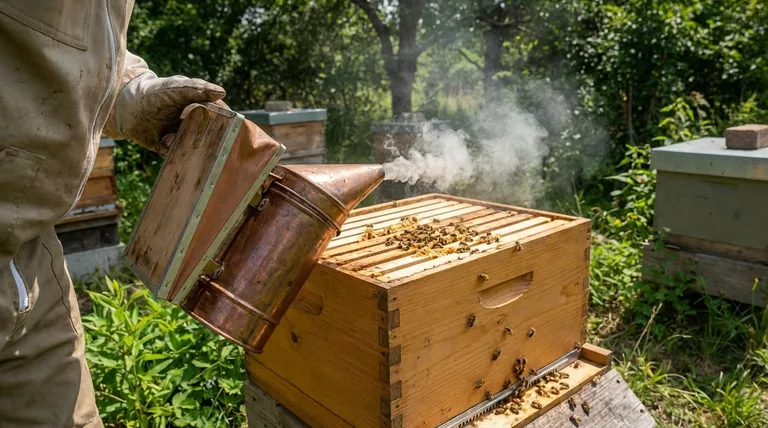
How Smoke Calms a Bee Colony
The effectiveness of a bee smoker hinges on two distinct biological and behavioral responses. Understanding these mechanisms is key to using the tool properly.
Masking the Alarm System
Honeybees, particularly guard bees, communicate danger by releasing alarm pheromones. This chemical signal instantly alerts the colony to a threat, triggering a coordinated defensive response—what we know as stinging.
The smoke from a smoker physically overwhelms and masks these pheromones. By disrupting this primary channel of communication, a single alarmed bee cannot incite the entire hive, preventing a small disturbance from escalating into a full-blown attack.
Triggering a Survival Instinct
Bees have an innate response to the presence of smoke, which they associate with a forest fire threatening their home. This perceived danger triggers a powerful survival instinct.
Their immediate priority becomes consuming as much honey as possible. They gorge themselves in preparation for potentially abandoning the hive and needing the energy to build a new one elsewhere. A bee with a full belly of honey is physically preoccupied and less agile, making it more difficult for her to flex her abdomen to sting.
Why a Calm Hive is Essential
Using a smoker is not just about avoiding stings; it's a cornerstone of responsible and effective beekeeping that protects the entire colony.
It Enables Safe Inspections
The most direct benefit is the protection of the beekeeper. Minimizing stings makes it possible to perform necessary tasks like checking for disease, monitoring the queen's health, and assessing food stores without significant personal risk.
It Reduces Colony Stress and Loss
A full defensive response is incredibly stressful for a hive. When a honeybee stings a mammal, its stinger lodges in the skin, and it dies shortly after.
By keeping the colony calm, the beekeeper prevents unnecessary bee deaths, preserving the workforce and overall health of the hive.
It Allows for Effective Management
It is nearly impossible to conduct a thorough inspection or harvest honey when thousands of bees are actively attacking you. A calm atmosphere allows the beekeeper to work deliberately and carefully, which is crucial for the delicate tasks required to maintain a thriving colony.
Understanding the Trade-offs and Best Practices
While essential, a smoker is a tool that requires finesse. Misuse can be counterproductive or even harmful.
Cool Smoke is the Goal
The objective is to produce gentle wisps of cool, white smoke. Hot smoke or excessive amounts can harm the bees and agitate them instead of calming them. It can also contaminate honey and wax with an unpleasant smoky flavor.
The Fuel Source Matters
Always use clean, natural, and untreated fuel. Common choices include pine needles, untreated burlap, dried leaves, or wood shavings. Never use synthetic materials, plastics, or anything treated with chemicals, as this can introduce toxins into the hive.
Smoke Is Not a Substitute for Gentleness
A smoker is not a license for rough handling. It is a tool that facilitates calm, but the beekeeper must still move slowly and deliberately. Abrupt movements can still trigger a defensive reaction, even with the use of smoke.
Making the Right Choice for Your Goal
Apply smoke strategically based on the task at hand and the temperament of your hive.
- If your primary focus is a routine inspection: Use a few gentle puffs at the hive entrance and under the top cover to set a calm tone before you begin.
- If you are performing a disruptive task (like harvesting honey): Be prepared to apply smoke more consistently, but gently, to maintain control as you manipulate frames and disturb the colony.
- If you are managing a known aggressive colony: The smoker is a non-negotiable safety tool; use it deliberately to prevent the bees' alarm from ever escalating.
Ultimately, the bee smoker is a tool of communication, allowing the beekeeper to work in harmony with the bees' natural instincts rather than against them.
Summary Table:
| Purpose | Mechanism | Benefit |
|---|---|---|
| Calm the Bees | Masks alarm pheromones and triggers a 'fire' survival instinct. | Reduces stings and colony stress during inspections. |
| Enable Safe Work | Creates a manageable environment for the beekeeper. | Allows for thorough hive checks and honey harvesting. |
| Protect the Colony | Prevents unnecessary bee deaths from defensive stinging. | Preserves hive health and workforce. |
Ready to manage your hives with confidence and care?
At HONESTBEE, we supply commercial apiaries and beekeeping equipment distributors with the high-quality, reliable tools needed for successful hive management. A well-maintained bee smoker is fundamental to your operation's safety and efficiency.
Let us be your trusted wholesale partner for all your beekeeping supplies. Contact our team today to discuss your needs and discover the HONESTBEE difference.
Visual Guide
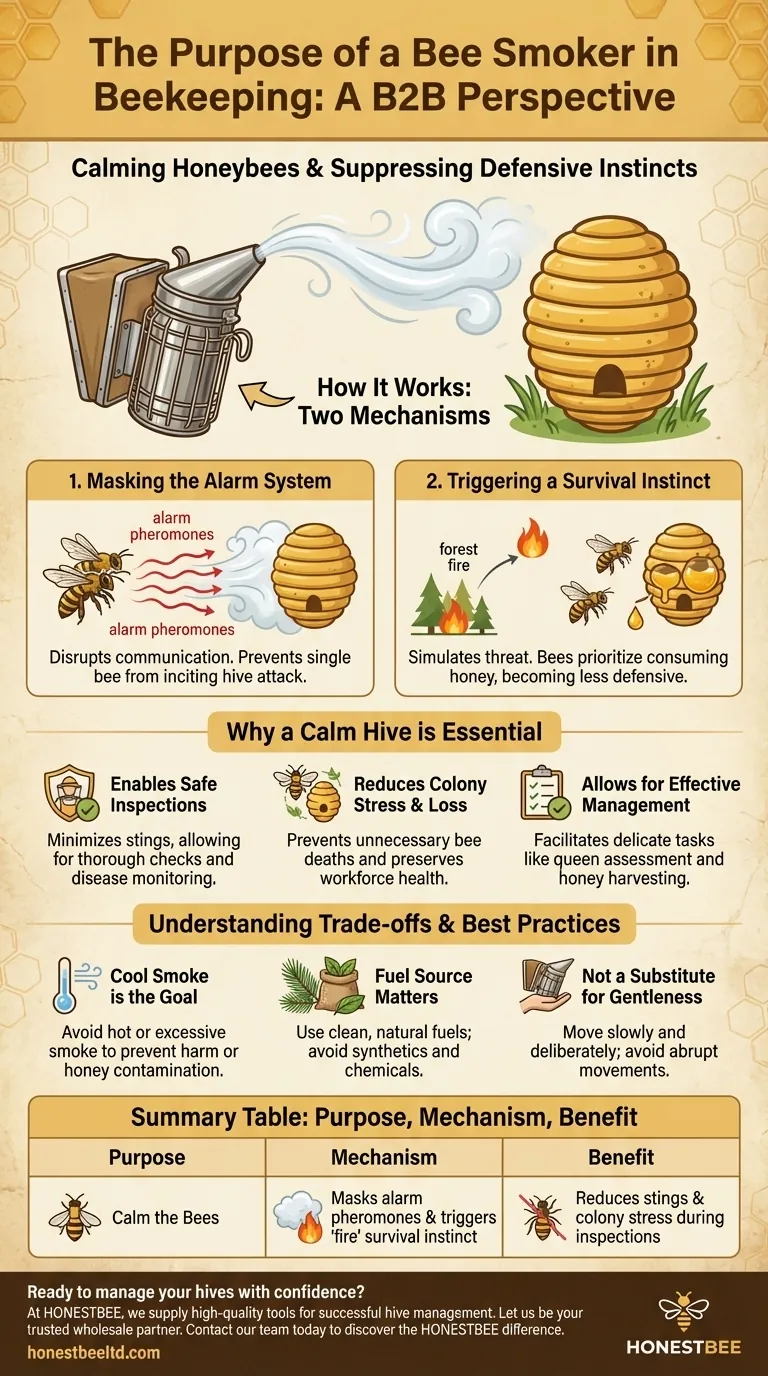
Related Products
- Premium Traditional Copper Bee Smoker with Bellows
- European Stainless Steel Bee Smoker for Honey Bee Hive
- Heavy-Duty Bee Smoker with Durable Plastic Bellows for Beekeeping
- Heavy Duty Manual Bee Smoker Blower for Beekeeping
- Electric Bee Smoker European Style Bee Hive Smoker for Beekeeping
People Also Ask
- Are bee smokers bad for bees? A Guide to Safe and Effective Use
- What are some quick tips for effective smoker use? Master Calm Hive Inspections with Expert Technique
- Can you smoke bees out of a hive? Why This Common Beekeeping Myth is Dangerous
- What is the purpose of a bee smoker? Calm Bees for Safer, More Efficient Hive Inspections
- What is the proper technique for lighting a bee smoker? Master the Layered Fire Method for Calm Hives






